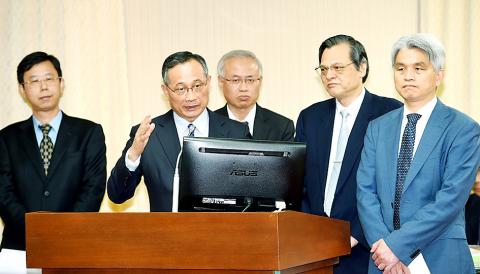The Ministry of Justice’s Investigation Bureau is investigating 33 cases of alleged Chinese funding to candidate campaigns for the Nov. 24 elections, bureau Director-General Leu Wen-jong (呂文忠) said yesterday.
Asked by Chinese Nationalist Party (KMT) caucus deputy secretary-general William Tseng (曾銘宗) during a meeting of the legislature’s Internal Administration Committee whether the suspect funds were coming directly from the Chinese government or affiliated organizations, Leu said: “You could say that.”
Many of the cases involved donations made through Taiwanese businesses in China, Leu said.

Photo: Fang Pin-chao, Taipei Times
When Tseng asked if any of the donations could have simply been made by those businesses, without Chinese help, Leu said the bureau has evidence that China is attempting to influence the elections by funding certain candidates and is preparing cases for prosecution.
If Taiwanese businesses were making the donations on their own, they would be legal, but the Political Donations Act (政治獻金法) and the Act Governing Relations Between the People of the Taiwan Area and the Mainland Area (台灣地區與大陸地區人民關係條例) prohibit donations made by Chinese individuals or entities, Leu said.
China has been attempting to circumvent these laws by making donations in other ways, such as through China-based Taiwanese businesses, with the money coming from China’s Taiwan Affairs Office, he said.
Four cases that are being investigated by prosecutors in Taipei and Changhua, Yunlin and Pingtung counties are being treated as alleged vote-buying, the bureau said.
Leu said Beijing had also invited some influential community leaders to visit China on all-expenses-paid trips in return for their backing of China’s favored candidates, but he would not give more details when pressed by committee members.
The bureau has identified certain candidates it believes are being funded by Beijing and it is building cases against them, he added.
The Taiwan High Prosecutors’ Office has conducted raids on two underground money exchanges, he said.
The raids were part of preparations for next month’s meeting of the Asia/Pacific Group on Money Laundering and aimed at cracking down on campaign violations, as some money meant to influence the elections has been flowing into the exchanges from China, he said.
Mainland Affairs Council Minister Chen Ming-tong (陳明通) told the committee that the council was already looking into the cases, but needed more specific information from the bureau.
Meanwhile, Minister of Justice Tsai Ching-hsiang (蔡清祥) called on the police to step up measures against foreign interference in next month’s elections.
Additional reporting by CNA

MAKING WAVES: China’s maritime militia could become a nontraditional threat in war, clogging up shipping lanes to prevent US or Japanese intervention, a report said About 1,900 Chinese ships flying flags of convenience and fishing vessels that participated in China’s military exercises around Taiwan last month and in January last year have been listed for monitoring, Coast Guard Administration (CGA) Deputy Director-General Hsieh Ching-chin (謝慶欽) said yesterday. Following amendments to the Commercial Port Act (商港法) and the Law of Ships (船舶法) last month, the CGA can designate possible berthing areas or deny ports of call for vessels suspected of loitering around areas where undersea cables can be accessed, Oceans Affairs Council Minister Kuan Bi-ling (管碧玲) said. The list of suspected ships, originally 300, had risen to about

DAREDEVIL: Honnold said it had always been a dream of his to climb Taipei 101, while a Netflix producer said the skyscraper was ‘a real icon of this country’ US climber Alex Honnold yesterday took on Taiwan’s tallest building, becoming the first person to scale Taipei 101 without a rope, harness or safety net. Hundreds of spectators gathered at the base of the 101-story skyscraper to watch Honnold, 40, embark on his daredevil feat, which was also broadcast live on Netflix. Dressed in a red T-shirt and yellow custom-made climbing shoes, Honnold swiftly moved up the southeast face of the glass and steel building. At one point, he stepped onto a platform midway up to wave down at fans and onlookers who were taking photos. People watching from inside

Japan’s strategic alliance with the US would collapse if Tokyo were to turn away from a conflict in Taiwan, Japanese Prime Minister Sanae Takaichi said yesterday, but distanced herself from previous comments that suggested a possible military response in such an event. Takaichi expressed her latest views on a nationally broadcast TV program late on Monday, where an opposition party leader criticized her for igniting tensions with China with the earlier remarks. Ties between Japan and China have sunk to the worst level in years after Takaichi said in November that a hypothetical Chinese attack on Taiwan could bring about a Japanese

The WHO ignored early COVID-19 warnings from Taiwan, US Deputy Secretary of Health and Human Services Jim O’Neill said on Friday, as part of justification for Washington withdrawing from the global health body. US Secretary of State Marco Rubio on Thursday said that the US was pulling out of the UN agency, as it failed to fulfill its responsibilities during the COVID-19 pandemic. The WHO “ignored early COVID warnings from Taiwan in 2019 by pretending Taiwan did not exist, O’Neill wrote on X on Friday, Taiwan time. “It ignored rigorous science and promoted lockdowns.” The US will “continue international coordination on infectious